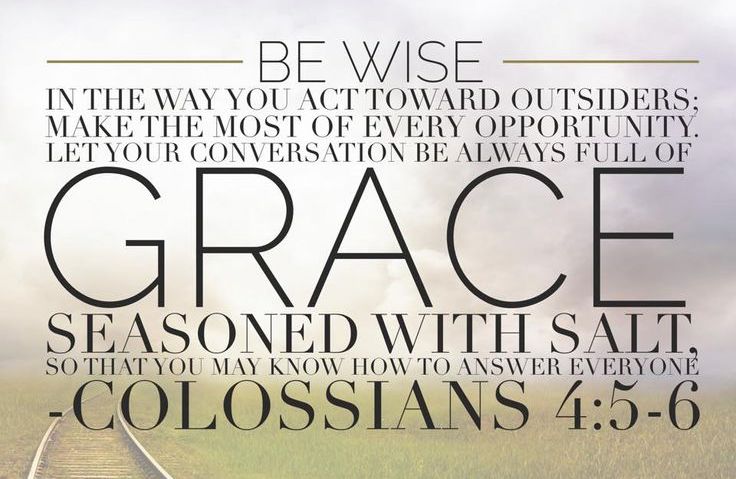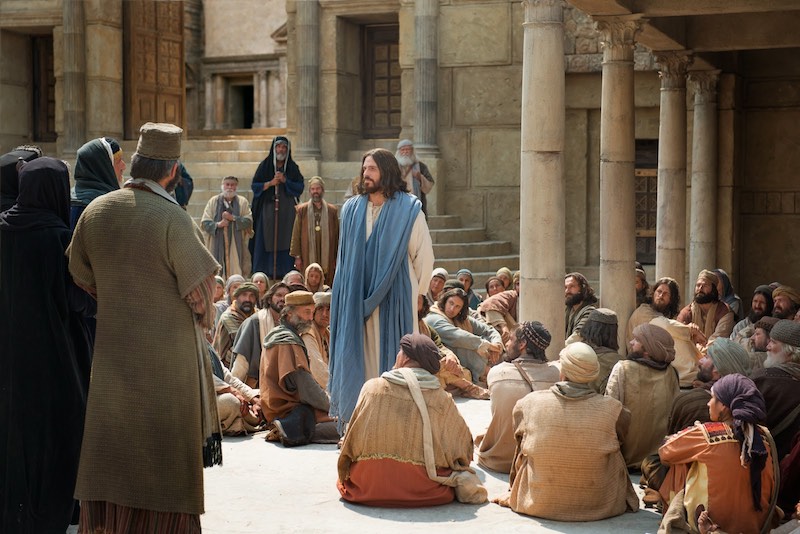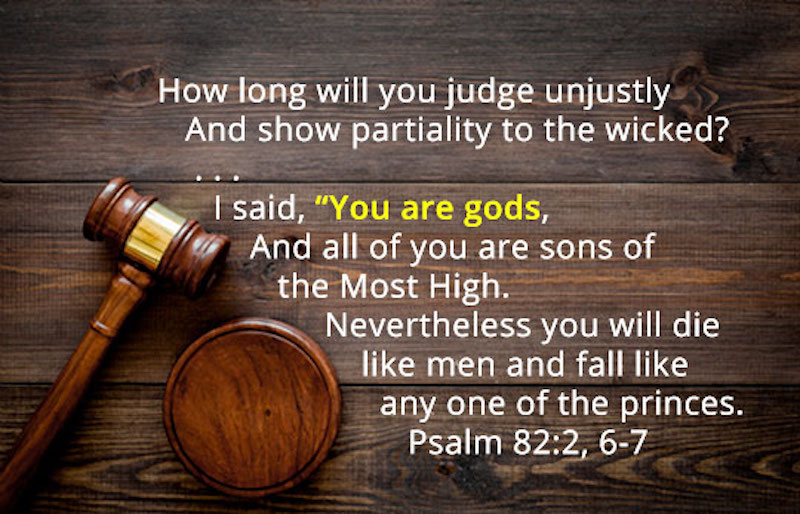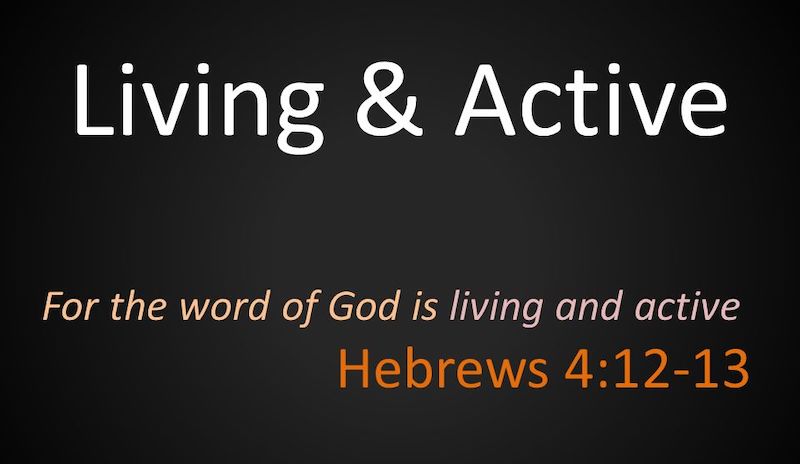Are you an effective communicator of God’s word? How would you describe a person who is an effective communicator of God’s word? There are obviously some people who are more gifted in this area than others, however, we all have the responsibility to communicate God’s word to others. We read the following exhortation in the New Testament of the Bible:
Conduct yourselves with wisdom toward outsiders, making the most of the opportunity. Let your speech always be with grace, as though seasoned with salt, so that you will know how you should respond to each person. – Colossians 4:5-6
No matter who we are or what one’s occupation is in life, we all need to make the most of every opportunity in sharing God’s word and making it relevant to the people with whom we are speaking. Yeshua was obviously a very effective communicator of God’s word and I will focus on one example from His life in this week’s article.

Are you the Messiah or not? This is the question that the Jewish people who were listening to Yeshua’s teaching two thousand years ago asked Him, as recorded in John chapter ten. The Scriptures tell us that this conversation took place in winter during the Feast of Dedication (Hanukkah), which typically falls in the month of December (John 10:22-23).
Yeshua had been teaching the people many things about who He is as the good shepherd and how He would lay down His life for His sheep (John 10:11-15). We later read that Yeshua was walking in the Temple area and how the people were arguing amongst themselves about who He really was (John 10:19-21) until they finally just asked Him:
The Jews then gathered around Him, and were saying to Him, “How long will You keep us in suspense? If You are the Messiah, tell us plainly.” Yeshua answered them, “I told you, and you do not believe; the works that I do in My Father’s name, these testify of Me. But you do not believe because you are not of My sheep. My sheep hear My voice, and I know them, and they follow Me; and I give eternal life to them, and they will never perish; and no one will snatch them out of My hand. My Father, who has given them to Me, is greater than all; and no one is able to snatch them out of the Father’s hand. I and the Father are one.” The Jews picked up stones again to stone Him. – John 10:24-31
Yeshua informed His questioners that He had already told them who He is as they Messiah but that they did not believe Him. He also told them that the works which He had done testify to who He is and that He is one with the Father. At these words they picked up stones to kill Him.
There was obviously a misunderstanding between Yeshua and the Jewish people with whom He was talking at that time. He openly told them who He was and what He came to do. If they really wanted to know if He was the Messiah, why would they try to kill Him? Yeshua addressed this very question to those who were threatening His life:
Yeshua answered them, “I showed you many good works from the Father; for which of them are you stoning Me?” The Jews answered Him, “For a good work we do not stone You, but for blasphemy; and because You, being a man, make Yourself out to be God.” – John 10:32-33
The conversation became very critical at this point. No longer were the people simply asking if Yeshua was the Messiah, they were now accusing Yeshua of blasphemy and making Himself equal with God.

Did Yeshua Commit Blasphemy?
The accusations that the people were making against Yeshua were actually true, at least in the contextual sense: Yeshua being fully man was claiming to be the Son of God as He claimed unity with the Father in heaven. Was this claim really blasphemy? Yeshua responded to the accusation of the people in the following manner:
Yeshua answered them, “Has it not been written in your Law, ‘I said, you are gods’? If he called them gods, to whom the word of God came (and the Scripture cannot be broken), do you say of Him, whom the Father sanctified and sent into the world, ‘You are blaspheming,’ because I said, ‘I am the Son of God’? If I do not do the works of My Father, do not believe Me; but if I do them, though you do not believe Me, believe the works, so that you may know and understand that the Father is in Me, and I in the Father.” Therefore they were seeking again to seize Him, and He eluded their grasp. – John 10:34-39
The first line of defense that Yeshua presented to His accusers was the very word of God (Psalm 82:6) and then He followed this up with the works that He performed which could only be attributed to God Himself.
Know Your Audience
One of the marks of an effective communicator is to know one’s audience. We see this illustrated well by Yeshua in His response to the Jewish people who had picked up stones to kill Him. Yeshua immediately preempted HIs quotation from the Hebrew Scriptures to defend His claim of deity with the phrase “…Has it not been written in your Law,…” For the Jewish person it is of utmost importance to have a belief system which is in harmony with God’s word, especially as it connects to the Law of God. Although the phrase that Yeshua quoted is found in the book of Psalms, we will later see how it relates to the Law or the Torah (the first five books of the Bible).
“You Are Gods!”
When Yeshua sought to defend Himself as God, along with His identity as the Son of God, He quoted from Psalm chapter eighty-two:
I said, “You are gods, and all of you are sons of the Most High.” – Ps. 82:6
This is a fascinating verse to use in His defense because it not only gives credence to men being called “gods” but it also states that men are also considered “…sons of the Most High.” As we study and understand the Hebrew language of this verse together with the context of this chapter, we can see more fully what Yeshua was actually communicating.
The Hebrew language for Psalm 82:6 reads as follows: אני אמרתי אלוהים אתם ובני עלון כולכם – Ani Amarti Elohim Atem Uhvnei Elyon Kulchem – “I said, ‘you are gods, and all of you are sons of the Most High.’” The interesting word to focus on in this verse is the word for “gods” which in Hebrew is the word אלוהים – Elohim. The Hebrew word Elohim is the general word used in the Bible for the One True God (Gen. 1:1) and it can also be used of false gods (Ex. 20:3). Here in Psalm 82:6 this word Elohim is uniquely used to speak of humans as gods or as those who possess deity. Why did Yeshua quote this verse? Was Yeshua claiming that we all are considered divine, i.e. Elohim – “gods”?
Are We Really All Gods?
The majesty of God’s word truly shines forth as we study this verse which Yeshua used to defend Himself as God as well as the Son of God. This one verse not only gave Yeshua a Scriptural foundation to defend Himself as being divine but there is also another truth that is being communicated through this Scripture that becomes evident when we understand the context of Psalm chapter eighty-two.
Since the psalm at hand is only eight verses in length, I will quote it here in its entirety in order for us to more fully understand the context of this chapter:
A Psalm of Asaph. God takes His stand in His own congregation; He judges in the midst of the rulers. How long will you judge unjustly and show partiality to the wicked? Selah.
Vindicate the weak and fatherless; Do justice to the afflicted and destitute. Rescue the weak and needy; deliver them out of the hand of the wicked. They do not know nor do they understand; they walk about in darkness; all the foundations of the earth are shaken. I said, “You are gods, and all of you are sons of the Most High. Nevertheless you will die like men and fall like any one of the princes.” Arise, O God, judge the earth! For it is You who possesses all the nations. – Psalm 82
The context of this chapter is clearly the subject of judges and judgment. God as the ultimate judge of the universe is being called on to judge the earth (or the people in it) because her earthly judges (rulers) were not executing justice in accordance with the holiness of God. How does this statement of calling men “gods” in the middle of this psalm relate to the context of judges and judgment as a whole?
A great deal of the Old Testament Scriptures are written in a poetic form which becomes more evident when we examine the Hebrew text of Psalm eighty-two. The first verse of this psalm actually introduces a poetic play on words. After the introduction of “A Psalm of Asaph,” the first verse reads: אלוהים נצב בעדת אל בקרב אלוהים ישפט – Elohim Nitzav Ba’ehdat El Bekerev Elohim Yishpot – “…God takes His stand in the congregation of God; He judges in the midst of the rulers.”
A form of the word Elohim actually appears three times in this verse, as they are highlighted in blue above: the first time it refers to God Himself, the second time it is speaking of “the congregation of God,” and the third time refers to “the rulers” of the people. The human rulers spoken of in the context of this chapter are clearly “judges,” those who make judgements for the people. We see how the word Elohim is used in Psalm eighty-two to mean both God and human judges. Therefore, the phrase “…You are gods…” is not declaring that all humans are “gods” but it is used in this context for those who are earthly judges and are considered as “gods” as they rule, as it were, in the place of God.

Elohim – Judges
There was always a segment of Israeli society who were appointed as judges to decide between matters and make decisions on behalf of the people of Israel. As judges, they stood in the place of God and they were to make just decisions as those who were accountable to God for their decisions. We actually see an example of this in this week’s Torah Portion reading:
If a man gives his neighbor money or goods to keep for him and it is stolen from the man’s house, if the thief is caught, he shall pay double. If the thief is not caught, then the owner of the house shall appear before the judges, to determine whether he laid his hands on his neighbor’s property. For every breach of trust, whether it is for ox, for donkey, for sheep, for clothing, or for any lost thing about which one says, ‘This is it,’ the case of both parties shall come before the judges; he whom the judges condemn shall pay double to his neighbor. – Ex. 22:7-9
Within the verses quoted above, the word “judges” appears three times and in each of these three occurrences the Hebrew word אלוהים – Elohim is used in the original Scriptures.
As noted earlier, the word Elohim is the general word for the One True God and it is also used to speak of “gods” in general. In rare occurrences, as we see here in Exodus twenty-two as well as Psalm eighty-two, this word Elohim is used to speak of human judges. When used in this manner, it appears that judges are given the title Elohim as they represent God on earth. This is similar to how Moses represented God before Pharaoh (Ex. 7:1). The title Elohim was also to remind earthly judges that they are responsible to God for their judgement and that they are to make just decisions.
In seeing how this word Elohim is used throughout the Hebrew Scriptures and specifically in Psalm eighty-two, I believe we see the true intention of Yeshua when He responded to His accusers in the following manner in John chapter ten:
Yeshua answered them, “Has it not been written in your Law, ‘I said, you are gods’? If he called them gods, to whom the word of God came (and the Scripture cannot be broken), do you say of Him, whom the Father sanctified and sent into the world, ‘You are blaspheming,’ because I said, ‘I am the Son of God’? If I do not do the works of My Father, do not believe Me; but if I do them, though you do not believe Me, believe the works, so that you may know and understand that the Father is in Me, and I in the Father.” – John 10:34-38
Yeshua quoted this verse from Psalm eighty-two in such a precise way and at the exact time to not only verify His identity but also to challenge His accusers who were acting as judges in their judgement against Him.
Be Careful How You Judge
Yeshua uniquely used Scripture to defend His identity as God and to declare that He is the Son of God. Beyond this, Yeshua was sending a strong message of rebuke to His accusers that they were to be careful in how they judge. According to Psalm eighty-two, rulers or judges (Elohim) must make righteous decisions because they are putting themselves in the place of God, Elohim, and God demands just decisions in accordance to His holiness. The accusers of Yeshua were unjustly using God’s Law to condemn Him of blasphemy while ignoring the clear evidence of the works which He performed which confirmed that He was and is the very Son of God.

Communicating the Living Word of God
In quoting this one verse (Ps. 82:6) from the book of Psalms, Yeshua caused His accusers to face the truth of who He is according to the word of God and reminded them that those who pass judgment are putting themselves in the place of God. God’s word is powerful and authoritative. We would be wise to learn to communicate God’s word in an effective manner as Yeshua did and to let God’s word have its way in others:
For the word of God is living and active and sharper than any two-edged sword, and piercing as far as the division of soul and spirit, of both joints and marrow, and able to judge the thoughts and intentions of the heart. And there is no creature hidden from His sight, but all things are open and laid bare to the eyes of Him with whom we have to do. – Hebrews 4:12-13
We need to learn how to wisely and effectively answer others in regard to spiritual truths as Yeshua has so masterfully illustrated for us in John chapter ten. We need to know God’s word, know the people with whom we are talking, and make the most of every opportunity to effectively communicate God’s word to others.
Shabbat Shalom!
If you enjoyed reading this article, share it today with friends! We also invite you to sign up for our weekly Torah Portion commentary on the sidebar to the right.
Help keep our weekly commentaries free and available to all. Click here to donate today:
*All Scripture take from NASB Copyright © 1960, 1962, 1963, 1968, 1971, 1972, 1973, 1975, 1977, 1995 by The Lockman Foundation
**The Hebrew name “Yeshua” is used in the biblical quotations in place of the English name “Jesus” to give emphasis to the meaning of this name, salvation. The word “Messiah” is also used in place of the word “Christ” to bring clarity to the office of Yeshua.



Great teaching Daniel.